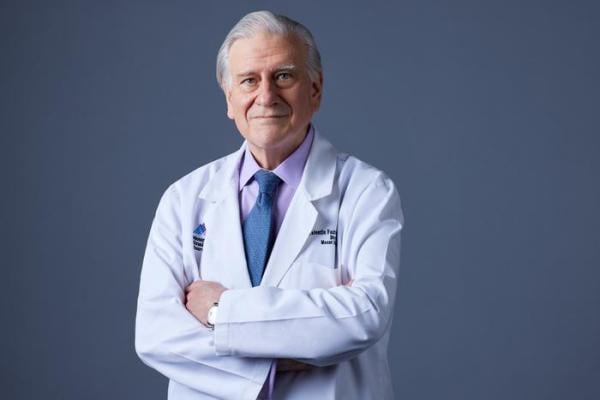
Dr. Fuster helped develop the cardiovascular polypill that was just added to World Health Organization's List of Essential Medicines. Image courtesy of Mount Sinai Health System
August 3, 2023 — The cardiovascular polypill, developed by the Spanish National Centre for Cardiovascular Research (CNIC) and the pharmaceutical company Ferrer, has been included by the World Health Organization (WHO) in its List of Essential Medicines.
The medication, known as a “polypill,” includes three active ingredients (acetylsalicylic acid, ramipril, and atorvastatin) and is effective in preventing secondary adverse cardiovascular events in people who have previously had a heart attack, reducing cardiovascular mortality by 33 percent in this population. Those are findings from the SECURE trial led by Valentin Fuster, MD, PhD, President of Mount Sinai Heart, Physician-in-Chief of The Mount Sinai Hospital, and General Director of CNIC. The groundbreaking results were published in August 2022 in The New England Journal of Medicine.
“The SECURE results showed for the first time that the cardiovascular polypill that we helped develop led to clinically relevant reductions in recurrent cardiovascular events in patients who had suffered a myocardial infarction,” said Dr. Fuster. “Adherence to treatment after an acute myocardial infarction is essential for effective secondary prevention. This cardiovascular polypill, as a strategy that combines three of the baseline treatments for these patients, has proven its value, because increased adherence means that patients are being treated for longer and, as a result, have a lower risk of cardiovascular events.”
The Essential Medicines List contains medicines that the WHO considers to be the minimum requirements for any health care system. It is updated every two years, and is internationally recognized, helping to prioritize effective and affordable medicines. As stated in the WHO report, “Essential medicines are those that satisfy the priority health care needs of a population. They are intended to be available in functioning health systems at all times, in appropriate dosage forms, of assured quality, and at prices individuals and health systems can afford.”
The polypill is marketed under the brand names Trinomia, Sincronium, and Iltria, depending on the country. It is the only polypill designed exclusively for patients who have experienced a cardiovascular event that is commercially available in 25 countries, and the feasibility of extending its distribution to additional territories, including the United States, is under analysis.
“The 33 percent reduction in cardiovascular mortality demonstrates the efficacy of treatment with Trinomia4 compared to standard treatment. The inclusion of this therapeutic solution in the WHO's List of Essential Medicines confirms our aim to make a positive impact in society and is an important step in our mission to bring significant and differential value to people with cardiovascular disease,” explains Oscar Pérez, Chief Marketing, Market Access, and Business Development Officer at Ferrer.
Dr. Fuster adds, “Since our groundbreaking study was published, we have seen an increase in polypill usage across the world and we are looking forward to have this medicine available in the United States and the rest of the countries where it is not available yet. This cardiovascular polypill could become an integral part of global strategies to prevent cardiovascular events in patients who have suffered a heart attack and who are currently already being treated with separate mono-components. This approach has the potential to reduce the risk of recurrent disease and cardiovascular death.”
For more information: https://www.mountsinai.org


 February 03, 2026
February 03, 2026 









